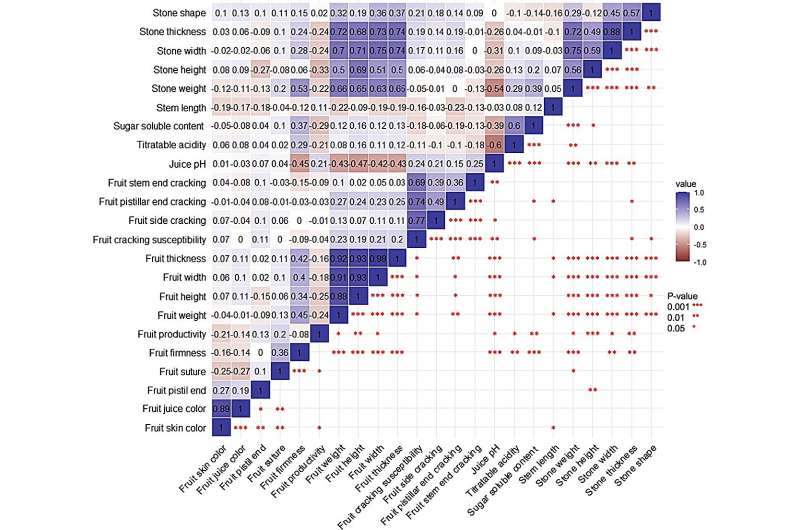This article has been reviewed according to Science X's editorial process and policies. Editors have highlighted the following attributes while ensuring the content's credibility:
fact-checked
peer-reviewed publication
trusted source
proofread
Enhancing sweet cherry breeding: Insights from genotyping-by-sequencing and genome-wide association studies

Sweet cherry (Prunus avium L.) is one of the most economically important perennial fruit species growing in temperate regions. However, partly due to climate change and biological pressures from pathogens, sweet cherry production in France has been declining since the 1980s.
Meanwhile, traditional breeding is a long process because of the extended juvenile phase and complex polygenic traits. Advances in genetic research, including quantitative trait locus (QTL) mapping and genome-wide association studies (GWAS), have identified markers for key traits but are limited by the need for extensive genotyping. Genotyping-by-sequencing (GBS) emerges as a promising solution, offering a cost-effective method for high-density SNP analysis to enhance breeding strategies.
In September 2023, Horticulture Research published research titled "Genome-wide association mapping in a sweet cherry germplasm collection (Prunus avium L.) reveals candidate genes for fruit quality traits."
This study first utilized a germplasm collection of 116 sweet cherry accessions to investigate 23 agronomic fruit quality traits over 2-6 years, and a high phenotypic variation of fruit quality traits was observed. Then, SNPs were analyzed by the genotyping-by-sequencing (GBS) approach.
Genome-wide association studies (GWAS) was conducted with 28 198, 34 864 and 33 760 SNPs in P. avium var. 'Regina,' P. avium var. 'Satonishiki' and Prunus persica 'PLov22n' genomes, respectively. Further, through GWAS using two multilocus models and three reference genomes, a total of 65 unique SNP-trait associations were identified for eight traits. Researchers also pinpointed several candidate genes involved in phytohormone, calcium, and cell wall metabolisms.
In order to identify potentially colocalizing SNP–trait associations of fruit quality traits, researchers summarized results from this study and nine previously published articles, and 11, 12 candidate genes were identified related to fruit size (fruit weight, fruit width, and fruit thickness) and fruit-cracking-related traits, respectively.
The study's robust methodology encompassed the characterization of phenotypic variation, revealing significant variability across the examined traits, with high broad-sense heritability for many, suggesting a strong genetic component. The GBS sequencing resulted in a rich dataset of SNPs, which, after quality and minor allele frequency filtering, facilitated the identification of genetic associations across multiple traits.
Population structure analysis revealed distinct subpopulations, contributing to a deeper understanding of genetic diversity within the collection. The identified SNP-trait associations, supported by a precise literature review for comparison and potential colocalizations of marker-trait associations, enhance our understanding of the genetic control of fruit quality in sweet cherries.
Overall, this knowledge underpins the development of marker-assisted selection strategies aimed at accelerating breeding efforts to satisfy both consumer preferences and producer needs, thus addressing the complexity of sweet cherry's genetic architecture and its impact on fruit quality traits.
More information: Armel S L Donkpegan et al, Genome-wide association mapping in a sweet cherry germplasm collection (Prunus avium L.) reveals candidate genes for fruit quality traits, Horticulture Research (2023). DOI: 10.1093/hr/uhad191
Journal information: Horticulture Research
Provided by NanJing Agricultural University





















